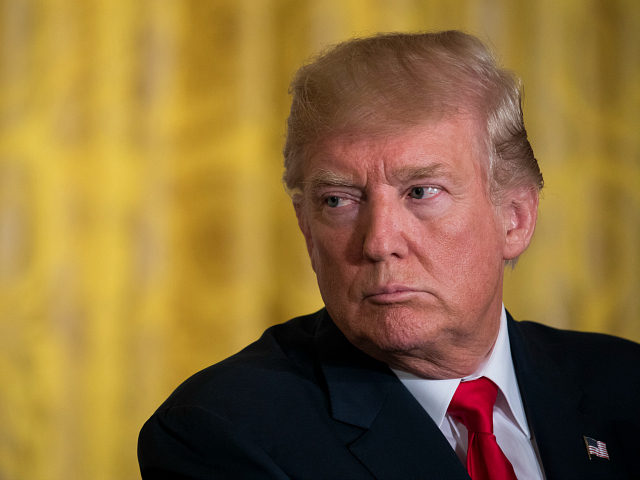Senate intelligence committee Democrat Sen. Ron Wyden (OR) wants the committee’s probe of Russian meddling to move into President Trump’s finances, despite opposition from Republican — and even Democratic — colleagues.
“I feel very strongly that the heart of this inquiry is all about following the money. Since Day One, I have said financial connections are Counterintelligence 101. The way you compromise somebody is through money. And the committee leadership has resisted making this a special priority,” he said Saturday in an interview with NPR.
The top Democrat on the committee, Sen. Mark Warner (VA), disagrees, saying the special counsel — not Congress — is the appropriate place to look into Trump’s finances. He also believes the committee’s investigation is proceeding in a “bipartisan way.”
But Wyden’s calls represent growing pressure from some Democrats for Congress to investigate Trump’s finances. They are seeking documents from financial institutions, including Deutsche Bank, which has loaned Trump and his family hundreds of millions of dollars for real estate ventures. Wyden also said he has put a hold on a senior Treasury Department nominee until he receives Treasury Department documents related to Russia.
Special Counsel Robert Mueller may already be looking into Trump’s finances, according to some reports. Mueller reportedly subpoenaed records from Deutsche Bank recently, and sources told the Washington Times that Mueller is “obsessed” with Trump’s network of business interests for potential money laundering violations.
Steve Bannon, former White House chief strategist, allegedly predicted that Mueller would try to pry into Trump’s finances to find some violation.
“You realize where this is going. This is all about money laundering,” Bannon allegedly said in the new book Fire and Fury, referencing Mueller’s deputy Andrew Weissman. “Mueller chose Weissmann first and he is a money-laundering guy. Their path to fucking Trump goes right through Paul Manafort, Don Jr and Jared Kushner. … It’s as plain as a hair on your face.”
In July, President Trump said in an interview with the New York Times that his finances should be off-limits.
Ronald Rotunda, the Doy & Dee Henley Chair and Distinguished Professor of Jurisprudence at Chapman University, told Breitbart News in an interview that it is Deputy Attorney General Rod Rosenstein’s job to make sure Mueller does not overstep the boundaries of his investigation.
“Mueller’s mandate is to investigate any criminal conspiracy involving the Russians and the Trump campaign. Mueller does not have any roaming commission or mandate to investigate whatever he feels like investigating,” said Rotunda, author of the book John Marshall and the Cases that United the States.
“The Deputy A.G., Rod Rosenstein, supervises Mueller, so you should ask Rosenstein what efforts he is making, if any, to supervise Mueller and keep him within his mandate,” he added.
Other legal scholars agree Trump’s finances are out of Mueller’s scope but say that, if he finds anything, it will ultimately be up to Congress.
“How is money laundering — which I do not think President Trump ever did — somehow connected to Mr. Mueller’s Russia probe?” Steven Calabresi, law professor at Northwestern University, told the Washington Times.
He said hearings on Trump would become contentious and partisan, but it could also “provide the nation an opportunity to witness a vigorous debate about something very big-picture and conceptual — the “criminalization of Mr. Trump’s politics.”
Rotunda said Mueller has already gone outside of his mandate by charging former Trump campaign chairman Paul Manafort and his associate Rick Gates with tax fraud and other related charges that predate their work on the Trump campaign.
“Was it proper to investigate Manafort for tax evasion? Should Mueller simply have asked the tax division of the DOJ to take over that part of the probe? Perhaps Mr. Rosenstein can explain why,” he said.
He also said of Mueller’s authorization of a predawn raid at Manafort’s home that it is “highly unusual and irregular to treat a white-collar suspect like a drug cartel leader.”
“The news portrayed that raid as a way to pushing Manafort. Perhaps it was, but you should ask Rosenstein if it is was appropriate to conduct such a raid when a subpoena would do,” he said.
Manafort is fighting the charges, and last week, he filed a lawsuit in U.S. federal court challenging Mueller’s legal authority to indict him on pre-2016 money laundering charges.
“By ignoring the boundaries of the jurisdiction granted to the Special Counsel in the Appointment Order, Mr. Mueller acted beyond the scope of his authority. Mr. Mueller’s actions must be set aside,” the filing said.
Nonetheless, Mueller’s willingness to probe actions unrelated to the campaign are encouraging Democrats like Wyden.
Wyden cited indictments against Manafort, former foreign policy campaign George Papadopoulos, and former National Security Adviser Michael Flynn, as an example of why the probe should move into Trump’s finances — although the indictments have nothing to do with Russian collusion.
“And it’s obvious with Paul Manafort, Mr. Papadopoulos, Mr. Flynn – the whole set of issues with respect to laundering money, shell companies and the like – this is what is being missed,” Wyden told NPR.
White House defense lawyers did not respond to inquiries from Breitbart News about whether Trump’s finances were outside the scope of Mueller’s mandate.

COMMENTS
Please let us know if you're having issues with commenting.